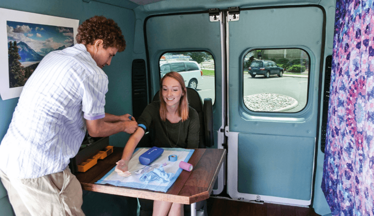Taking Research to the Streets
Meet the CannaVan – a mobile lab that lets University of Colorado Boulder researchers carry out cannabis research on the fly.
Frustrated by restrictions on studying the acute effects of cannabis in the lab, a team from the Institute of Cognitive Science at the University of Colorado Boulder decided to take their lab to the people. The mobile laboratory takes the somewhat incongruous form of a Dodge/Mercedes Sprinter van, modified to include a phlebotomy and assessment station.
We spoke to researcher Cinnamon Bidwell to find out more about how the team is using this lab-on-wheels in a new study on cannabis in chronic pain.

What tests do you perform in the van?
Our latest study tests the effects of cannabinoid levels in blood on pain relief, inflammation, and cognitive function in chronic low back pain patients who choose to use edible cannabis. Blood levels of THC and CBD will be measured at our regular lab before, during, and after a two-week exposure period to determine whether there are associations with pain, inflammation, sleep, physical activity, anxiety/depression, and cognitive function. At the two-week point, we also test the acute effect of their chosen cannabis edible – that’s where the mobile lab comes in. We assess measures of functional movement, cognition, motor control, drug intoxication, and biomarkers of stress and inflammation. Afterwards, participants will be followed for six months to collect self-reported data on cannabis use, pain levels, sleep quality, and mental health symptoms.
What are the advantages of the mobile lab?
The ability to collect real-world data on legal market cannabis products across a range of individuals and diseases is an incredible advantage. Given the rapidly changing legal environment, there is great public health need for data on the health effects of cannabis as it is used and sold on legal markets. Historically, data on the effects of cannabis are based on low-potency government cannabis that bears little resemblance to the products people actually use, leaving an important gap in current health and policy discussions around cannabis.

What motivates you?
Consumers and patients are suffering as a result of a lack of scientific knowledge, with commercial interests promoting health and wellness products for which there is little to no scientific evidence. I am excited to provide empirical data that can move the needle forward, providing strong scientific research on the medical and societal impacts of cannabis that can – and should – inform the design of equitable social and
health policies.
What research would you like to do in the future?
Relief from pain is the most commonly cited reason for medicinal cannabis use, with improved anxiety/mood and sleep in at second and third. While there is a growing consensus about the promise of cannabinoids for treating pain, there is still much that is not known, including what kinds and doses of cannabinoids are most effective (there are over 600 known plant constituents), how different cannabinoids function during pain relief, how best to administer treatments, timing of treatments, and what works for whom and under what conditions. I hope to contribute to this body of knowledge in ways that improve patients’ lives.












